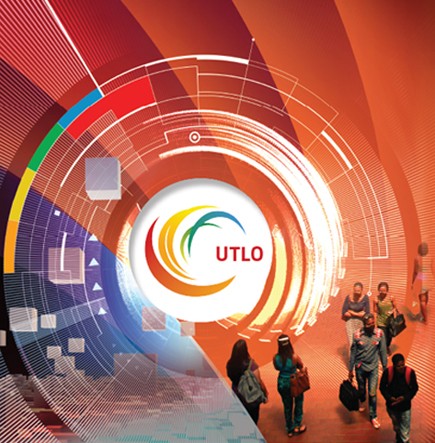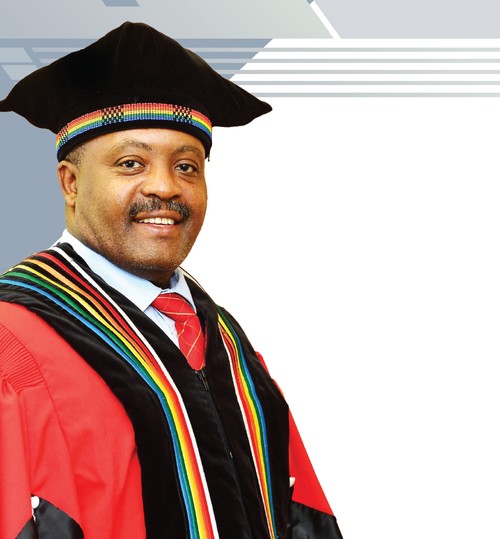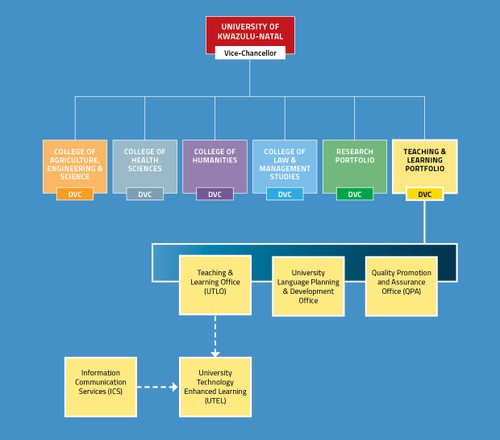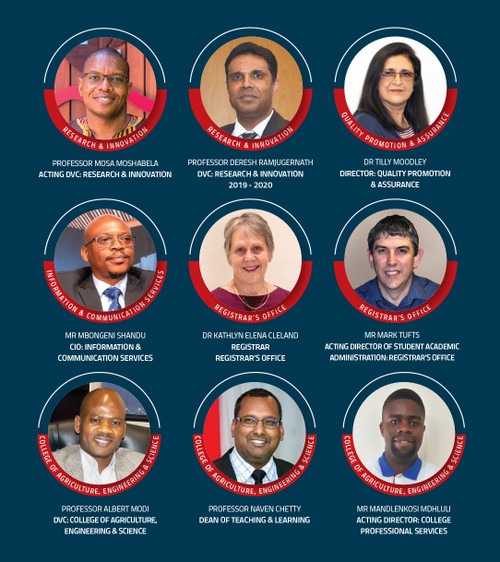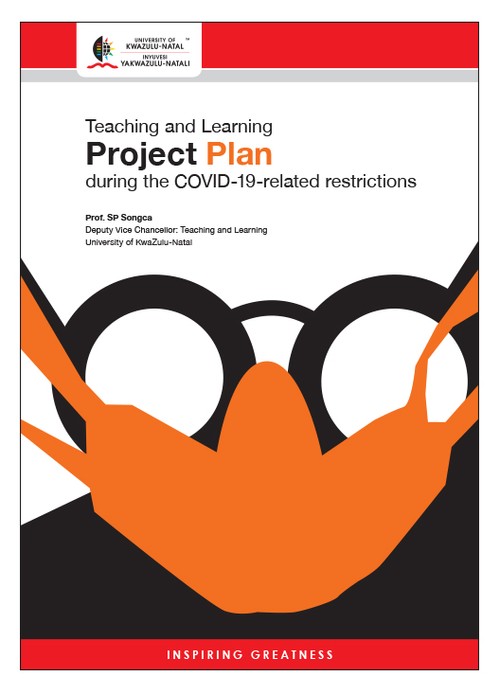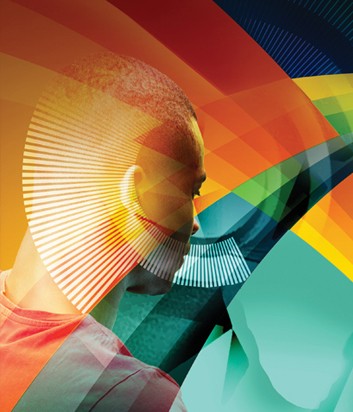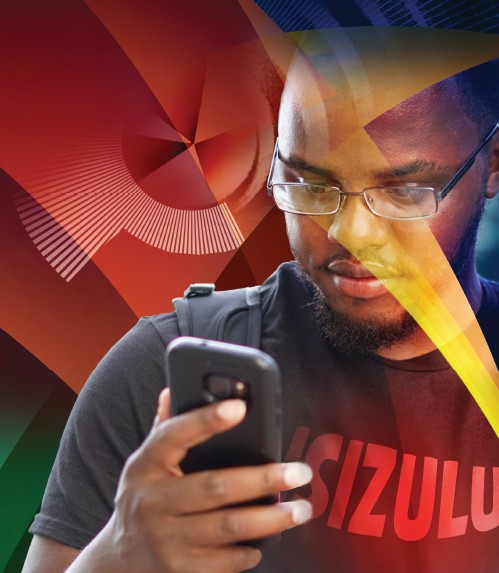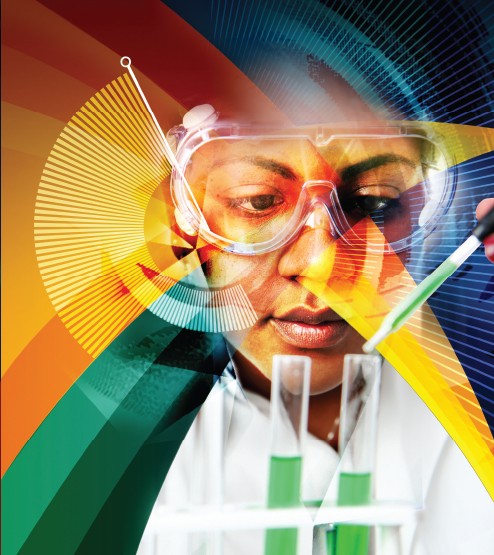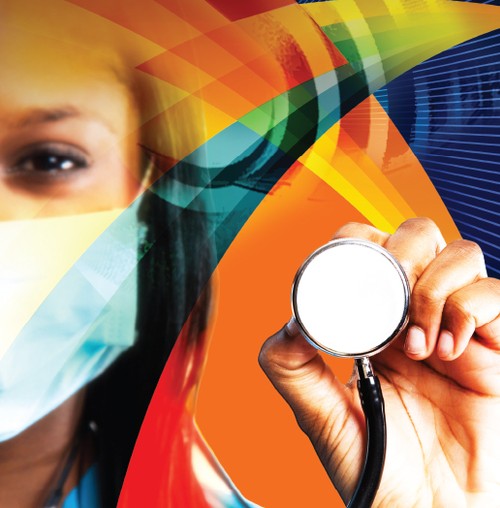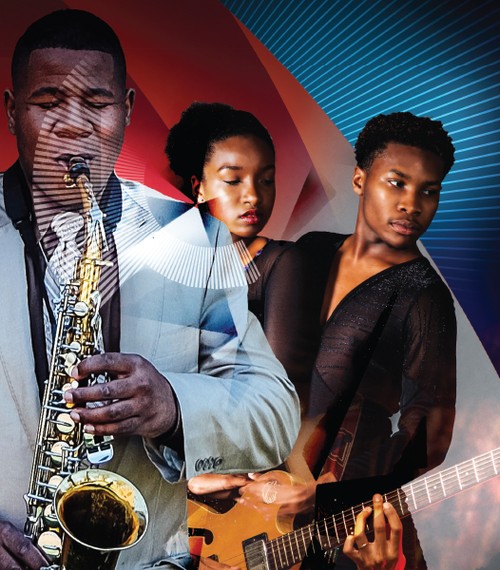The Teaching & Learning Office in the College of Humanities (CHUM) is led by Professor Ruth Hoskins, supported by the School Academic Leaders of Teaching & Learning and the AMS in the College (Access Programme, Peer Mentors, WP, and ADOs). The 2019/2020 School Academic Leaders for Teaching & Learning were: Dr Miranda Young-Jahangeer (Arts), Professor Sarah Gibson (Applied Human Sciences), Drs Sandile Mbokazi and Phindile Shangase (Built Environment and Development Studies), Dr Samukelisiwe Khumalo (Education), Dr Heidi Matisonn (Religion, Philosophy and Classics) and Dr Janet Muthuki (Social Sciences). The members of the Teaching & Learning Unit all played a significant role in the development and implementation of the transition to remote teaching and learning necessitated by the COVID-19 pandemic in 2020 whilst remaining committed to the mission of the College to promote “excellence in African-led scholarship through teaching, research and community engagement in a global context” and in realising the University’s strategic goal of “excellence in teaching and learning”.
Teaching & Learning Workshops
The College used its UCDP funding for staff development to enhance teaching and learning experiences across its six Schools. Led by Professor Labby Ramrathan, three webinars were held during the university lockdown period. The first focused on continuous assessment – the concept and processes for inclusion within the teaching and learning process. The second webinar focused on integrating continuous assessment within digital teaching and learning platforms, with a specific focus on three types of continuous assessment – multiple choice questions, essay type assessments and quizzes. The third webinar was on using the Moodle teaching and learning platform for continuous assessment. COVID-19 presented an opportune moment to fast-track academic staff to shift to digital spaces for teaching and learning. Four books published through the Alternations African Book Series focused on curriculum, teaching and learning within the Humanities in the time of COVID-19. Staff from the College and from across Southern Africa’s higher education institutions contributed chapters to these. More publications are emerging from the work of the CHUM Curriculum Transformation Team.
 The continuous assessment workshop led by Professor Anil Kanjee (Tshwane University of Technology), Dr Upasana Singh (UKZN), and Professor Labby Ramrathan (UKZN).
The continuous assessment workshop led by Professor Anil Kanjee (Tshwane University of Technology), Dr Upasana Singh (UKZN), and Professor Labby Ramrathan (UKZN).
The College offered a number of workshops on the implementation of its online teaching and learning strategy. Several staff members from across the College led workshops to capacitate staff on pedagogical strategies for online teaching and learning, including workshops on online assessment. The School of Education was able to bring on board their international partners from Denver University and Colorado State University Global to run the workshops. The School also utilised the expert services of our English Language Fellow, through our partnership with the American Embassy.
The School of Applied Human Sciences hosted the Teaching and Learning Indaba: Engaging Online Assessments in collaboration with the UNISA Academic Development Open Virtual Hub (ADOVH) Project, from 7-8 December 2020. Organised by Professors Matshepo Matoane and Sarah Gibson, the Indaba was open to all staff within the College.
The CHUM also hosted a webinar on “Inclusive Teaching During and Beyond the COVID-19 Disruption” that featured Dr Roshanthni Subrayen (UKZN Disability Unit); Professor Tsediso Makoelle (Nazarbayev University) and Professor Monaheng Sefotho (University of Johannesburg). The event was facilitated by Professor Dipane Hlalele (UKZN).
Curriculum Transformation
Through its curriculum transformation initiatives, the following new programmes and courses were developed and approved in the College:
- Approval for a new site of delivery for the Bachelor of Social Science Honours in Criminology and Forensic Studies, Discipline of Criminology and Forensic Studies (Pietermaritzburg campus), School of Applied Human Sciences.
- Advanced Diploma in Adult and Community Education and Training Teaching by Dr Anne Harley and Prof Hugo, Discipline of Adult Education, School of Education.
- The Bachelor of Social Science Honours in Population Studies and Bachelor of Social Science Honours in Development Studies were approved in the School of Built Environment and Development Studies.
- The Music Foundation Programme was approved for the School of Arts.
- New undergraduate majors in Theology and Biblical Studies were developed by the School of Religion, Philosophy and Classics on the Pietermaritzburg campus for introduction in 2021, following CAAB approval in 2020.
- A new Bachelor of Arts Honours in Applied Ethics was accredited in the School of Religion, Philosophy and Classics, and will be registered with the South African Qualifications Authority (SAQA).
- 2020 also saw the first cohort of students graduate with the Postgraduate Diploma in Professional Counselling, in the School of Applied Human Sciences. The programme, which leads to registration as a professional psychological counsellor with the Health Professions Council of South Africa (HPCSA), is offered on the Pietermaritzburg campus. The 2019 cohort was the first group to study the course, which makes this 2020 graduation special for the School.
 Some of UKZN’s first cohort of graduates for the Postgraduate Diploma in Psychological Counselling.
Some of UKZN’s first cohort of graduates for the Postgraduate Diploma in Psychological Counselling.
Implementation of the UKZN Language Policy
The College provided strategic support across the University to achieve the objective of developing African languages, in this case, IsiZulu, for the purposes of academic and scientific discourse. It facilitated several vocabulary and terminology development workshops across Disciplines. The availability of technical and scientific vocabulary in isiZulu will go a long in furthering the University’s efforts to provide epistemological access to our students, the vast majority of whom are drawn from lower quantile schools (Quintiles 1 – 3). Bilingual tutorials were offered for the Social Work 112, Criminology 101 and 102, and Psychology 101 and 102 modules. Many modules offered across the College now offer course outlines that have been translated into isiZulu, and many are developing innovations in bilingual teaching and assessment. Through collaboration with the ULPDO, staff members in the IsiZulu Discipline offer isiZulu tutorial training for staff across the University.
Community Engagement
 Above: Members of the Ma’at Institute at UKZN at a debriefing session at Nsimbini Primary School.
Above: Members of the Ma’at Institute at UKZN at a debriefing session at Nsimbini Primary School.
The School of Applied Human Sciences has approached community engagement with a view to developing work-integrated learning and enhancing teaching, supervision and research. Current projects include:
- The Ma’at Institute: COVID-19 psychosocial support programme – R4.8 million funding from the Health and Welfare Sector Education and Training Authority (HWSETA). The programme is led by Dr Zibane (Social Work), Dr Buthelezi (Psychology) and Prof Mkhize (DVC and Head of College).
- CCMS and Art, Culture and Heritage for Peace (ARROWSA) – An MOU was signed between UKZN’s Centre for Communication, Media and Society (CCMS) and ARROWSA with educational research and community engagement objectives for the period 2020-2023. The parties will work together to continue the collaborative relationship they enjoy in educational/experiential learning and research activities and to promote the sharing of knowledge and expertise for mutual benefit. The partnership aims to raise the profile of art, culture and heritage for social change locally, nationally, in Africa and in the rest of the world.
- The CCMS and NORHED (the Norwegian Programme for Capacity Development in Higher Education and Research and Development) – Signing of an MOU to strengthen the capacity of higher education institutions in developing countries to promote inclusive education and to produce higher quality research. The CCMS was a partner in the NORHED I project. NORHED II was announced in 2020, and a team consisting of the Norwegian Lutheran Academy, the Ugandan Christian University, the University of Rwanda, and the CCMS (led by Professor Ruth Teer-Tomaselli) was successful in its bid for a second project titled “Preparing Media Practitioners for a Resilient Media in Eastern Africa (2021-2026)”.
- The CCMS secured donations for students through the UKZN Foundation from RewardsCo (2019 – R120 000 for bursaries; 2020 – R120 000 for honours laptops), and East Coast Radio (2020 – R586 938 for tuition fees).
- The Discipline of Psychology on the Pietermaritzburg campus finalised an MOU with the Chicago School of Professional Psychology in 2020. It aims to promote academic cooperation and strengthen ties that will result in a better understanding between the two institutions, support the internationalisation of their programmes, and enhance contributions to their respective institutions.
The School of Arts engaged in a number of initiatives to embrace community engagement. Due to the COVID-19 protocols, the following innovations were introduced:
- The Centre for Creative Arts (CCA) Forum for Community Engagement Leaders at the University has now been formalised. The CCA’s engagement with the community occurs through its four festivals – JOMBA! Time of the Writer, the Durban International Film Festival and Poetry Africa. As COVID-19 continues to surge, other online platforms have been created including, among others, Jomba Legacy; Jomba Digital Edge; Dance on Screen; Digital Jomba Fringe, Dance in Lockdown and moving to the digital medium, Jomba Khuluma Blog and Digital Newspaper have been developed. The online DIFF Festival was successfully hosted from 10-20 September 2020.
- The Hexagon Theatre went digital. Digital programmes were designed to enable the theatre to remain functional and continue to engage with the local audience digitally through social media, mass media and the Internet. In partnership with digital arts and film, the Hexagon has the ability to livestream shows through campaigns for funding in partnership with the ticketing system “Webtickets”. Webtickets allows audiences to buy tickets for a live link to shows that the artist is livestreaming. It also provides the option for the audience to make a donation to support the artist or theatre.
- Dr Miranda Young-Jahangeer produced a video with her Drama students on basic knowledge of the coronavirus that was posted on YouTube and received many views and comments.
 Above: Drama students creating the COVID-19 educational video.
Above: Drama students creating the COVID-19 educational video.
The School of Education developed and hosted a number of community engagement initiatives:
- Teachers’ Day Awards: The School hosted the first Teachers’ Day awards in recognition of teachers who offered outstanding support to UKZN students during teaching practice. It plans to leverage on this recognition to establish stronger partnerships between the University and schools in the province.
- Multi-Grade Teaching Seminar: The province of KwaZulu-Natal still has more than 700 schools that offer multi-grade teaching – one teacher teaching a number of grades within one classroom. In light of the absence of active teaching by the University in this area, as well as limited research in this field, the School hosted the first multi-grade teaching seminar at UKZN. In 2020, the School also hosted the first conference on rurality and schooling, in order to develop a critical group of academics and research in this field for the purposes of quality teaching as well as research. While the School views this project as an important community engagement project, it aims to link the University’s other functions to it for greater impact.
- Gender-Based Violence Seminar: Through the leadership of the DVC and Head of College, the School hosted the first Gender-Based Violence Seminar. It was addressed by the Deputy Minister of Higher Education and Training, Mr Buti Manamela, and was attended by more than 400 staff and students. The aim was to listen to the experiences of students at UKZN and to develop appropriate strategies.
- Numeric: The School has established a community engagement partnership with an NGO named Numeric. The Numeric Distance Learning Project attracted about 17 UKZN Education students who offered their teaching services and knowledge for high-impact after-school Mathematics programmes aimed at primary school learners in Gauteng, the Western Cape, and KwaZulu-Natal. This partnership sees primary school disadvantaged learners being supported in mathematics by senior UKZN students.
- Transformation of space: The School launched three newly-named buildings on the Edgewood campus in 2019. The buildings are named after women struggle stalwarts who made meaningful contributions to education. The new building was named after Ellen Kuzwayo, a lecture theatre in the new building was named after Phyllis Naidoo and the reconfigured conference centre was named after Dulcie September.
- In pursuit of UKZN’s African scholarship and decolonisation project, Dr Zamo Hlela introduced a unique partnership between UKZN, the broader Edendale community, the Sinomlando Centre – a non-governmental organisation, and Queens University, Belfast. The project has received funding to host an international conference in 2022 and is looking at re-presenting the history of Edendale in Pietermaritzburg.
- The Science Education and the Mathematics Education Disciplines are collaborating with the University of the Free State on a project: ‘Science for the Future’. The science cluster is working on Key Concepts in Science for Grades seven to nine Natural Sciences content. Teacher recruitment and training roll-out commenced in the second half of 2019. Further collaboration for the period 2021-2023 has been agreed on. It is expected that the enrolment of schools and teachers in the project will increase with inter-school mentoring groups.
 Above left: Mr Sazi Nxumalo, one of 17 UKZN students who are part of the Numeric Distance Learning Project. Above right: Eldest niece of Dulcie September, Ms Theresa Arendse receives a framed reproduction of the plaque on the conference centre named after her aunt from DVC and Head of College, Professor Nonhlanhla Mkhize, and Ms Xoliswa Zulu.
Above left: Mr Sazi Nxumalo, one of 17 UKZN students who are part of the Numeric Distance Learning Project. Above right: Eldest niece of Dulcie September, Ms Theresa Arendse receives a framed reproduction of the plaque on the conference centre named after her aunt from DVC and Head of College, Professor Nonhlanhla Mkhize, and Ms Xoliswa Zulu.
The School of Education submitted a funding application to the Banking Sector Education and Training Authority (BANKSETA) in 2020 and was awarded a grant of R2 189 250. In partnership with the Community Development Association Foundation, 200 young people in Limpopo will be trained on digital technologies and be offered career guidance.
Academic Monitoring and Support
With the shift to remote teaching and learning in 2020, the College moved its AMS programmes to online platforms. The WP, Peer Mentorship Programme, and consultations with ADOs were all offered remotely via online platforms including Moodle, Zoom, and WhatsApp.
The Writing Place
The WP is an academic support service within the CHUM’s Teaching and Learning Unit that is tasked with improving students’ academic writing and critical thinking skills through an emphasis on essay/ assignment structure and understanding academic concepts. While the WP is for Humanities students, students from other Colleges also receive assistance.
The primary function of the WP is to provide one-on-one academic writing tutoring for Humanities students at WP Drop-in Centres located on the Howard College (Main EG Malherbe Library), Edgewood (S202 Main Tutorial Building) and Pietermaritzburg (B6 Old Main Building) campuses. A trained tutor works through a student’s essay in direct discussion with the student to assess whether she/he is addressing all parts of the essay question and to offer suggestions on how the structure and grammar can be improved. Correct referencing techniques and the consequences of plagiarism are also explained. Tutors assess the essay in its entirety for structure and cohesion, but do not edit each sentence for grammatical issues. Students with serious grammar problems are encouraged to return for follow-up sessions based on the assumption that practice increases proficiency. For serious content-related problems, the student is referred to her/his tutor and/or lecturer. At the initial consultation the student is provided with a step-by-step academic writing guide, which includes information on referencing and exam and test writing techniques.
 The CHUM WP held a workshop for first year master’s students on writing a proposal.
The CHUM WP held a workshop for first year master’s students on writing a proposal.
Apart from one-on-one sessions, the WP offers a voluntary academic writing workshop series. Students are guided through a series of weekly 45-minute interactive sessions designed to assist with understanding essay questions, planning the essay structure, constructing coherent arguments and referencing techniques. The workshops are based on a WP writing guide and facilitated by tutors. Academic writing styles, academic language and correct referencing techniques are addressed. The workshops would not have been possible without the collaboration of the WP Unit and the College ADOs who market them to students in their respective Schools, enabling the WP to reach many students. The workshops are also advertised on the University website (notices page), Facebook WP page and posters around campuses.
In addition to undergraduate students, the WP runs academic writing workshops for postgraduate students. While they focus on Humanities students, students from other Colleges also attend. The workshops are divided into three series, with the first aimed at developing topics and proposals, the second on thesis development (writing), focusing on the literature review and methodology sections and the third series focused on data analysis (qualitative and quantitative).
The WP also organised software training workshops for postgraduate students on NVIVO and SPSS. In 2020, the WP’s individual consultations and voluntary workshops were all offered remotely via online platforms including Moodle, Zoom, and WhatsApp.
Peer Mentorship Programme
The Peer Mentorship Programme is offered to all first-year students across the College. During 2020, it was offered remotely via online platforms such as Zoom and WhatsApp.
Academic Development Officers
Since 2019, ADOs have been appointed to offer support across all programmes in the College. Whilst they held regular face-to-face meetings with students to offer academic counselling and curriculum advice in 2019, following the COVID-19 restrictions, these consultations were offered remotely, mainly via email, WhatsApp or Zoom. Generic email addresses were set-up for all ADOs working in the College (by School and campus). The College ADOs were also instrumental in identifying students with psychosocial issues who needed to be invited back to campus (when restrictions allowed) or to be referred to Student Support Services.
Foundation Programme (BSS4)
While the COVID-19 pandemic severely affected higher education in general and teaching and learning in particular, the Access Programme was most affected due to its nature and the characteristics of the students it targets. Academic and professional staff were called on to develop new teaching and learning strategies that would make it easier for students to study. Remote learning was not easy for students from disadvantaged backgrounds who required psychosocial and academic support from the programme to succeed in their studies. The principle of ‘no one should be left behind’ was adopted. Despite challenges such as students’ access to online materials, late distribution of data and laptops to students, network challenges in areas were students are located, communication breakdown between students, lecturers and tutors, and obtaining permits for those who were eligible to return to campus, the academic and professional staff, and students were able to overcome the odds and 2020 was a successful year.
This is explained by multiple factors. The main drivers of success were the academic staff who were encouraged to participate in all the trainings and workshops organised by the CHUM’s Teaching & Learning Office to equip staff members to conduct remote teaching and learning. They received all the necessary equipment and teaching tools that made it easier for them to interact with students remotely and to respond to all their academic challenges. The majority of students were positive and willing to collaborate with academic and professional staff, and quickly adapted to the new pedagogical strategies of teaching and learning remotely, and the use of social networks and platforms such as Zoom, Facebook, and WhatsApp.
Awards and Achievements
– Education academic Professor Bheki Khoza received a UKZN 2020 Distinguished Teachers’ Award. The award recognises teachers/lecturers who have a favourable and lasting influence on students and display evidence of an educational impact beyond the classroom. All those who teach at UKZN and promote the importance of excellence in teaching are considered for these annual awards. – Dr Samu Khumalo, Professor Jaya Naidoo, Dr Ash Singh-Pillay, Dr Ngcobo and Mrs Van Wyk were awarded the Dean’s Special Award in the School of Education for their contribution to the School’s teaching and learning team. – Professor Sarah Gibson received the Outstanding Leadership Award for her contribution to teaching and learning in the School of Applied Human Sciences in the Dean’s COVID-19 Special Recognition Awards. Dr Ruwayda Petrus received the Outstanding Support Award for her contribution to teaching and learning in the School of Applied Human Sciences in the Dean’s COVID-19 Special Recognition Awards. – Professor Bernard Matolino (Philosophy, Pietermaritzburg campus) was selected as one of four Presidential Fellows of the African Studies Association (ASA), and was flown to Boston to present his work at the 62nd Annual Meeting of the ASA in 2019. – Professors Donal McCracken and Sarah Gibson were appointed judges of the Global Undergraduate Awards programme. Prof McCracken serves on the History panel, whilst Prof Gibson serves on the Anthropology and Cultural Studies panel. This is the world’s largest global undergraduate academic awards programme that recognises undergraduate excellence in research.
- Clinical Sociologist in the School of Social Sciences: Dr Mariam Seedat-Khan created an online platform to help teachers and parents find digital resources and learning tools for their learners and children to use during the lockdown. Adults can also use it to learn a new language, enrol in an online course or develop new skills.
Research in Teaching & Learning
The Teaching & Learning Unit in the CHUM, in collaboration with the CAES was involved in developing, administering and evaluating surveys on UKZN staff’s teaching training needs and student experiences during online teaching and learning in 2020. The survey’s findings identified possible interventions for smooth transition to remote teaching and learning.

